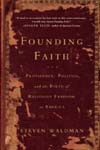 In his July 4 speech, George bush edited a Thomas Jefferson letter in a way that truly distorts its meaning. (Hat tip: Andrew Sullivan)
In his July 4 speech, George bush edited a Thomas Jefferson letter in a way that truly distorts its meaning. (Hat tip: Andrew Sullivan)
Bush said:
In one of the final letters of his life, he wrote, “May it be to the world, what I believe it will be — to some parts sooner, to others later, but finally to all — the Signal of arousing men to burst the chains, and to assume the blessings and security of self-government.”
Andrew points out that the full text of Jefferson’s comment was:
May it be to the world, what I believe it will be, (to some parts sooner, to others later, but finally to all,) the signal of arousing men to burst the chains under which monkish ignorance and superstition had persuaded them to bind themselves, and to assume the blessings and security of self-government.
Jefferson’s comments came in a letter he wrote June 24, 1826. The nation was getting ready to celebrate the 50th anniversary of the Declaration. In declining an invitation to participate in festivities, an 83-year-old Jefferson said that he hoped the regular July 4 celebrations would “forever refresh our recollections of these rights, and an undiminished devotion to them.”
What rights was he referring to? The pursuit of happiness? No taxation without representation? In these weeks before his death, those were not the rights Jefferson was thinking of most. It was this rejection of old-fashioned religion – “monkish ignorance” — that allowed Americans “to assume the blessings and security of self government.”
He summarized the essence of the Declaration of Independence as being the establishment of “the free right to the unbounded exercise of reason and freedom of opinion.” He continued:
“The general spread of the light of science has already laid open to every view the palpable truth, that the mass of mankind has not been born with saddles on their backs, nor a favored few booted and spurred, ready to ride them legitimately, by the grace of God.”
This seems to be a reference both to divine-right-based monarchical tyranny in general and Calvinism in particular (“a favored few” empowered “by the grace of God.”)
In other words, for Jefferson, the Declaration of Independence established the triumph of reason and science over backwards-looking religion.
I should point out that while this was Jefferson’s interpretation, others in the Continental Congress didn’t share his view. When the draft went into the hall it mentioned only Divine Providence and the Creator. When it came out, it also mentioned the Supreme Judge of the World, a decidedly Biblical conception of God. The lesson: Those who promote traditional religion ought to be verrrry careful quoting Jefferson because he was, well, a heretic.

